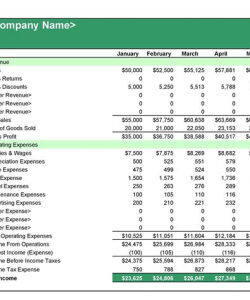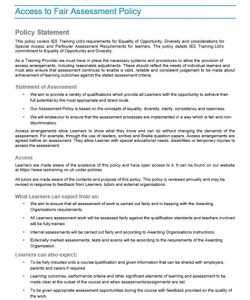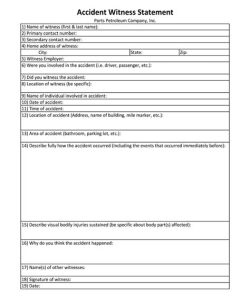To ensure that legal decisions are made based on accurate and reliable information, family law courts require witnesses to provide written statements. These statements serve as testimonies and provide a record of events relevant to the case. A well-crafted family law witness statement template can guide witnesses in presenting their accounts clearly, concisely, and objectively. It helps ensure the court has a comprehensive understanding of the facts of the case.
To assist individuals involved in family law matters, we provide a comprehensive guide to creating an effective family law witness statement template. This article will cover the essential elements of a witness statement template, including the significance of accuracy, the importance of adhering to legal guidelines, and tips for writing a persuasive statement. By understanding the nuances of family law witness statements, individuals can contribute to a fair and informed legal process.
Elements of a Family Law Witness Statement Template
A family law witness statement template typically includes the following elements:
1. Witness information: This section includes the witness’s full name, address, contact information, occupation, and relationship to the parties involved in the case.
2. Case information: This section identifies the court, case number, and names of the parties involved.
3. Statement of facts: This is the core of the witness statement and should provide a chronological account of events relevant to the case. The witness should state the facts in a clear, concise, and objective manner, avoiding opinions or conclusions.
4. Supporting evidence: If the witness has any supporting evidence, such as documents, photographs, or audio recordings, they should be listed in this section.
5. Signature and notary: The witness must sign and date the statement in the presence of a notary public. The notary will then notarize the statement, which verifies the witness’s identity and the authenticity of their signature.
Accuracy and Objectivity in Witness Statements
Accuracy is paramount in family law witness statements. Witnesses have a legal obligation to provide truthful and accurate testimony. Any misstatements or omissions can undermine the credibility of the witness and potentially impact the outcome of the case. Witnesses should carefully review their statements for accuracy before signing and notarizing them.
In addition to accuracy, witnesses must strive for objectivity in their statements. They should avoid stating opinions or drawing conclusions unless specifically asked to do so. The purpose of a witness statement is to provide a factual account of events, not to advocate for any particular party or outcome.
Tips for Writing a Persuasive Witness Statement
To write a persuasive family law witness statement, consider the following tips:
1. Be specific: Provide specific details about events, including dates, times, and locations. Avoid using vague or general language.
2. Use clear and concise language: Write in a manner that is easy to understand. Avoid using jargon or technical terms that the reader may not be familiar with.
3. Support your statements with evidence: If possible, provide documentary evidence or other materials that support your statements.
4. Be truthful and objective: Remember that you have a legal obligation to tell the truth. Avoid stating opinions or drawing conclusions unless specifically asked to do so.
Conclusion
A well-crafted family law witness statement template can assist witnesses in providing clear, accurate, and objective testimony. By adhering to the elements outlined in this article and following the tips for writing a persuasive statement, witnesses can contribute to a fair and informed legal process. Remember, accuracy and objectivity are crucial in ensuring that family law decisions are made based on reliable information.
By providing a comprehensive understanding of family law witness statements, we empower individuals to navigate the legal system with confidence. Whether you are a witness, a party to a case, or a legal professional, understanding the nuances of witness statements is essential for achieving successful outcomes in family law matters.



